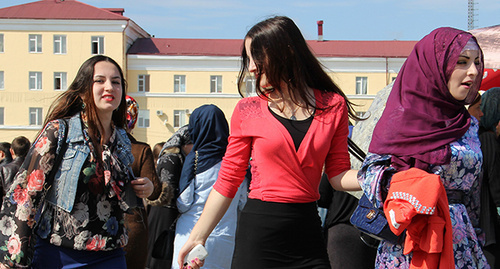
19 May 2015, 15:26
In Chechnya, marriage of man and minor girl raises debates about polygamy
At the State Duma, MPs debate on the introduction of responsibility for polygamy, and the authorities of Chechnya talk of the possibility of the legalization of such a family order as polygamy within the framework of Sharia. The topic has become urgent as a result of the recent sensational weddings of the police chief in Grozny.
The "Caucasian Knot" has reported that on May 16, in Grozny, Nazhud Guchigov, the chief of the ROVD (District Interior Division) of the Nozhai-Yurt District of Chechnya, and 17-year-old Kheda (Louiza) Goylabieva got married. It has been reported that the girl has been forced to marry and that caused a public resonance in Chechnya. Nazhud Guchigov himself, the leaders of the region and Children's Ombudsman Pavel Astakhov have denied the information. It was reported that, according to some sources, the police chief wanted to marry the girl as a second wife.
The radio station "Echo of Moscow" reports with reference to Olga Alimova, a member of the State Duma Committee on Family, Women and Children Affairs, that the initiative to introduce responsibility for polygamy is likely to be discussed by the State Duma.
Polygamy is becoming increasingly popular among Russian Muslims; however, religious marriages and polygamy should not be legalized in Russia. This opinion was expressed by Damir-Khazrat Mukhetdinov, the First Deputy Chairman of the Spiritual Administration of Muslims (SAM) of Russia. Meanwhile, he has also noted that talks about the possible legalization of religious marriages and polygamy in Russia "undermine the foundations of the secular state."
The traditions of marriage and family existing among Muslims were supported by Archpriest Vsevolod Chaplin, the head of the Synodal Department for Relations between the Church and Society.
Magomed Daudov, the head of the administration of the Chechen leader, spoke in favour of the legalization of polygamy, but only within the framework of Sharia. He has added that polygamy is common in the Caucasus, and therefore, "it would be nice to somehow regulate that fact."
The Kremlin is not familiar with the initiative to legalize polygamy voiced by Magomed Daudov. This was reported by Dmitry Peskov, the Presidential Press Secretary.
Earlier, Chechen leader Ramzan Kadyrov spoke in favour of the legalization of polygamy. The "Caucasian Knot" has reported that in April 2009, Ramzan Kadyrov expressed the opinion that despite the absence of the concept of polygamy in Russia, Chechnya needed it. In 2011, the Chechen leader repeated the same idea and claimed that legalized polygamy would be a more honest form of a family than a "love triangle".
Full text of the article is available on the Russian page of 24/7 Internet agency ‘Caucasian Knot’.




